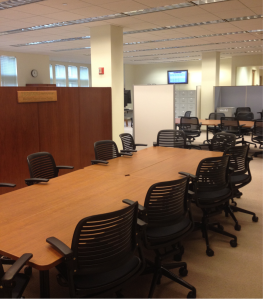A new student organization center will be opening on the fourth floor of Thomas J. Meskill Law Library in room 413. The new space, which formerly housed UConn Law’s microfiche and microfilm collections, will now be used as a workspace for all student organizations on campus.
“The student organizations space came into being because we did not have space on campus to provide each student organization with an office,” said Jocelyn Kennedy, the Director for Library Services.
Kennedy, who helped over see the project, added that the new room opened because the Law School “did not have dedicated rooms available for student organizations to come together to meet, work, and store their materials.”
“The idea is that this is going to be a collaborative space,” said Jennifer Cerny, Assistant Director of Student Services. Cerny, who spearheaded the project, started by polling student leaders last spring and asking them what they wanted in the space.
The room is now made up of two round, boardroom-style tables, a lounge area, and a few desks. The back wall of the room is decorated with original student art, faculty photos, and there is a plan to hang up framed UConn Law t-shirts from years past. Upon entering the room, students will see a wood-carved sign made by Gary Mackiewicz, a facilities staff member, engraved with golden letters reading “UConn School of Law, Student Organization Center.” “It gives the feeling of a sort of college newspaper room,” said Cerny.

“The room is designed with round tables, which I feel is an excellent mode of fostering informal and open dialogue during student group meetings,” said Sarah Polio, the Chief Administrative Officer for the Student Bar Association. “One ambition for this space is to facilitate collaboration and a sharing of ideas between student groups. The room is, in part, designed to encourage inter-group discussions and partnerships for the programming of campus events,” Polio continued.
Cerny hopes that the room will attract more students to join an organization. “The idea is to have students look in through [the student lounge in room 418] and say ‘that looks cool, maybe I’ll join an org.,’” said Cerny.
Putting the room together was a collaborative effort from the Law School’s different departments. “I.T. was a huge help and super generous in their donations,” Cerny said, pointing out the three LCD televisions that hang on the room’s wall and two movable computer stations equipped with cameras “so a member of an organization, or a guest speaker, can Skype into meetings,” Cerny added.
“Our student organizations bring members of the bar and judiciary to campus, they educate us all on a wide variety of topics and create lively discourse throughout campus,” said Kennedy, adding, “the student organization space will facilitate the development of programming on campus.”
Executive members of student organizations will have key access to the area and will be able to use the room at their leisure.
“This space is really for all of the student organizations to meet and to work collaboratively, particularly as they work to plan events, symposium and other activities on campus,” said Kennedy.
Student Services will be inviting members of organizations, faculty advisors, and alumni to tour the new space on October 9th from 5:30 p.m. to 6:30 p.m.
